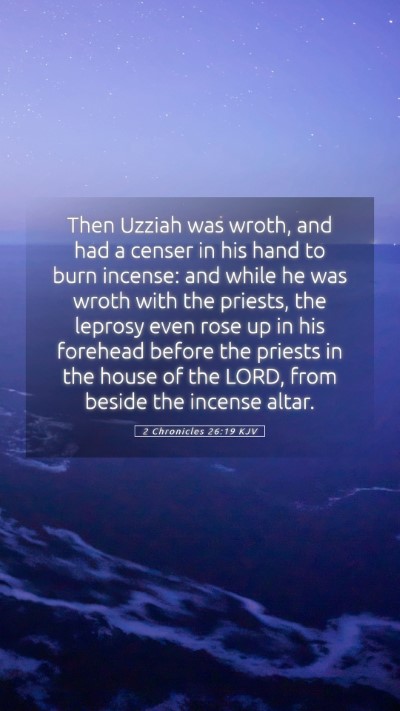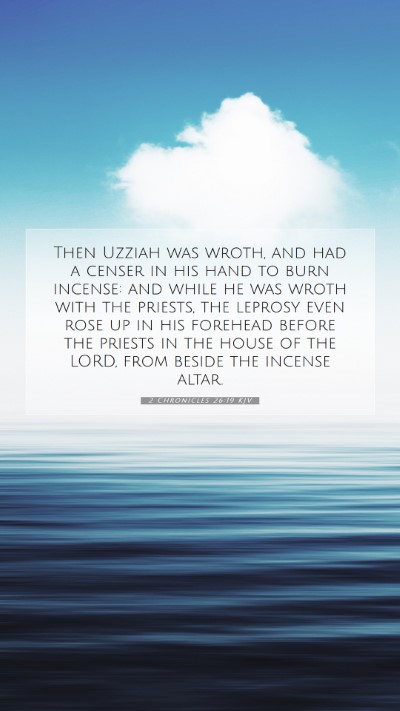Understanding 2 Chronicles 26:19
Verse Reference: 2 Chronicles 26:19 states, “Then Uzziah became furious, and he had a censer in his hand to burn incense. And while he was angry with the priests, leprosy broke out on his forehead before the priests in the house of the Lord, beside the incense altar.”
Overview of the Verse
This verse describes a pivotal moment in the reign of King Uzziah, highlighting his anger towards the priests and the immediate consequence which was leprosy breaking out on him. This event serves as a testament to the seriousness of defying divine order and highlights the relationship between worship, authority, and God’s judgment.
Insights from Public Domain Commentaries
-
Matthew Henry's Commentary:
Henry emphasizes the tragic downfall of Uzziah who, despite his prior faithfulness and achievements, chose to overstep his boundaries by performing priestly duties. His anger indicates a lack of humility and an attempt to elevate himself above the authority established by God. Uzziah's leprosy serves as both a punishment and a warning to all kings about the sacred nature of the priestly role.
-
Albert Barnes' Notes:
Barnes notes that Uzziah's fury was not just a personal matter but a critical breach of divine law. The act of burning incense was reserved for the priests alone, as prescribed in the law. Uzziah’s leprosy—an outward sign of his inward sin—demonstrated the immediate accountability that God requires of His leaders.
-
Adam Clarke's Commentary:
Clarke highlights that Uzziah’s actions reflect the precarious nature of power. He began well, but pride led him to act against God's law. Clarke notes that this instance serves as a broader lesson regarding proper worship and the dire consequences of assuming roles that were not designated to individuals by divine appointment.
Thematic Analysis
This passage teaches significant lessons about:
- The Nature of Authority: Uzziah's story illustrates the importance of respect for divinely ordained structures within worship. It serves as a sobering reminder that all believers, especially leaders, must operate within the framework established by God.
- Consequences of Pride: Uzziah’s anger and subsequent punishment signal a clear message about the perils of pride and overstepping one’s bounds. His actions led to disastrous consequences that affected his life and reign.
- Divine Judgment: The leprosy that afflicted Uzziah expresses God’s immediate response to sin. This incident highlights the swift nature of divine judgment against those who choose to act outside of God's law.
Applications in Daily Life
Understanding 2 Chronicles 26:19 offers practical applications:
- Humility in Leadership: Every leader should heed the importance of recognizing their limitations and respecting the roles designated by God.
- Listening to Authority: This verse reminds believers to listen to spiritual authorities in their lives, acknowledging the roles they play in guiding their spiritual journeys.
- Understanding the Sacred: Believers are called to understand the significance of worship and the proper avenues for approaching God, reinforcing the concept that worship is not to be taken lightly.
Related Scripture Cross References
- Leviticus 10:1-2 - The account of Nadab and Abihu who offered unauthorized fire before the Lord and faced dire consequences.
- Numbers 16:1-3 - The rebellion of Korah which illustrates consequences for challenging God’s appointed leaders.
- Isaiah 6:5 - Uzziah’s eventual leprosy led him to a state where he could not approach the worship of God, similar to Isaiah’s realization of his unworthiness before God.
Conclusion
2 Chronicles 26:19 serves as a powerful reminder about the importance of maintaining proper conduct in worship and leadership. Through careful examination of Uzziah's actions, we garner significant insights into the importance of humility, respect for God’s ordained authority, and the serious consequences of straying from divine law. Believers today can apply these lessons to enhance their understanding and practice of faith.


